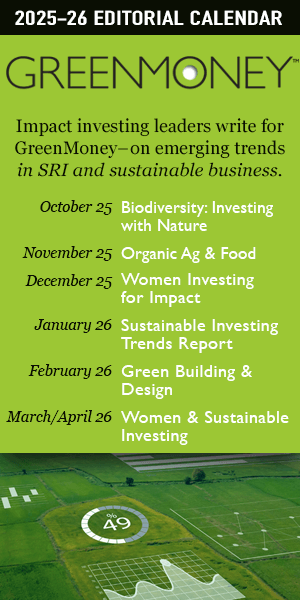 A few years ago, during an off-the-record conversation with the long-time CEO of a major responsible investing firm, I heard an enthusiastic paean to the rapid progress of ESG and impact investing. All signs pointed to accelerating activity in the field, I was told. There was just one speed bump: Where was the money?
A few years ago, during an off-the-record conversation with the long-time CEO of a major responsible investing firm, I heard an enthusiastic paean to the rapid progress of ESG and impact investing. All signs pointed to accelerating activity in the field, I was told. There was just one speed bump: Where was the money?
The question was a comment on the disconnect at that time between the increasing interest in sustainable investing and a noticeable lag in real investment. This firm had established sustainable investment products over several years — and they still weren’t attracting the funds.
No doubt, the money has arrived now.
The flood has been accelerated by BlackRock CEO Larry Fink, whose 2021 annual letter to the business community bluntly states that the climate transition “presents an historic investment opportunity.” When $8.6 trillion in AUM speaks, markets listen.
Fink’s call to action — his third such manifesto since 2018 — echoed the 2015 announcement by Mark Carney, then-governor of the Bank of England: “Climate change is the investment opportunity of our generation.” His credo was an historic turning point in the conversation about investment focused on climate change, emphasizing opportunity over risk. The real evidence came with the growing body of studies that showed so-called “profits with purpose” were beginning to outperform traditional investments in returns.
Just how much investment are we talking about? In its most recent, bi-annual report, US SIF: The Forum for Sustainable and Responsible Investment counts $17.1 trillion in sustainable assets under professional management at the end of 2019. That’s a 42% increase from the $12.0 trillion identified two years prior. The total represents 33% of the $51.4 trillion in total U.S. assets tracked by Cerulli Associates.
Then there’s this: Financial firms issued a record $357.5 billion of green and sustainable bonds in the first nine months of 2020, up 96% from the same period in 2019, according to Refinitiv. The proceeds are earmarked for projects related to climate change.
This movement of money has been noticed. Under the energetic headline “A Surge in Green Financing Boosts Climate Businesses,” a Washington Post story stacks up more big numbers:
- From January through November 2020, investors in mutual funds and exchange-traded funds invested $8 billion globally in sustainable assets, a 96% increase over the sum for all of 2019.
- Goldman Sachs is on record for directing $750 billion to clean energy financing over the next decade after already investing or financing $115 billion since 2006.
- A new multi-billion dollar fund at the investment firm TPG will be dedicated exclusively to fighting climate change. Its executive chairman will be Henry Paulson, a former Goldman chief executive and U.S. treasury secretary.
We could add to this swelling climate finance pile two recent developments that give substantial amounts to the sustainable investment bottom line. I’m talking about General Motors’ announcement that the company will only sell zero-emission cars and trucks by 2035. You could argue that this visionary strategy is a practical response to the growing market for electric cars. GM, like other carmakers, is in danger of being left in the dust by the speeding success of Tesla, a company now valued by investors at more than the valuation of GM, Ford and Fiat Chrysler combined (north of $700 billion at the time of writing – early February). The electric car revolution and its accompanying billions in manufacturing costs and sales revenue and, yes, potential profits, will be a classic case study in market-driven disruption — if it is not already being studied in MBA programs.
This bold move tallies with the equally large announcement of President Biden’s recent climate-related executive order, directing the federal government to place the climate center stage in its national security policy. The order included a request for a National Intelligence Estimate on the security threat posed by climate change. If the NIE finds that climate change is a serious risk, the federal government budget could be recalibrated to reflect a climate-first procurement policy. The financial implications of potential investment by, say, a Department of Defense with its annual budget of $700+ billion ($5 billion for R&D in 2020) are as huge as that overall budget figure. With its history of multi-billion dollar projects that stretch over decades, federal money could add a real boost to private equity action. As a Bloomberg News headline drily notes, “Biden Just Linked Climate and Security. Next Comes Military Money.”
And that’s just part of the sweeping Biden pledge to dedicate 40% of federal investments in clean energy, clean water, clean transit, affordable and sustainable housing, and training and workforce development.
A final note: The new chief economic advisor to the White House is Brian Deese, former head of BlackRock’s Sustainable Investing division. In that post, he advised clients on how to achieve returns using ESG criteria. In the coming months, we can expect an unprecedented alignment between Wall Street and Washington — that is, between the private sector and public policy — on climate finance and investment in climate-related innovations. Bet on it.
Article by John Howell, Editor, Climate Finance Weekly, Climate & Capital Media.
Article reprinted with permission. GreenMoney Journal and Climate & Capital Media have a strategic partnership.


















